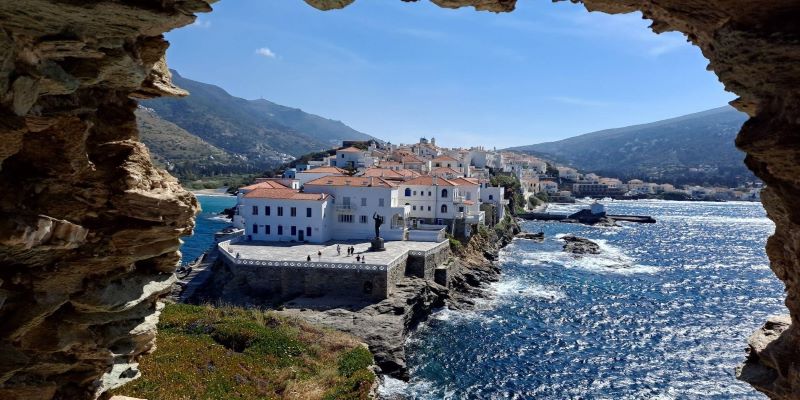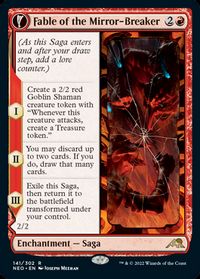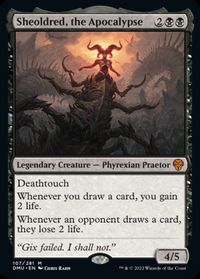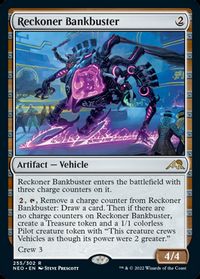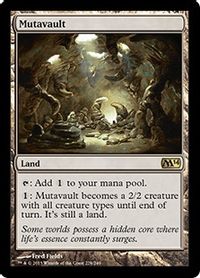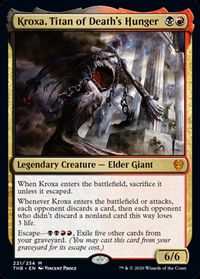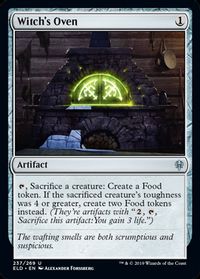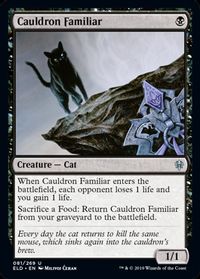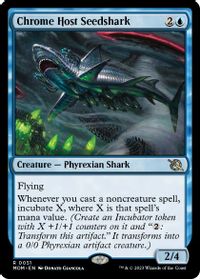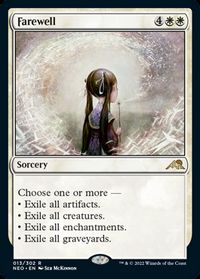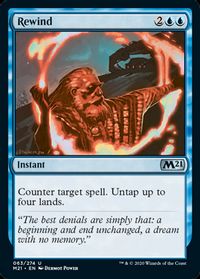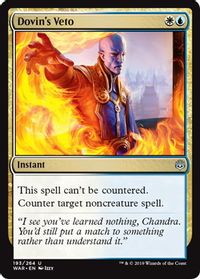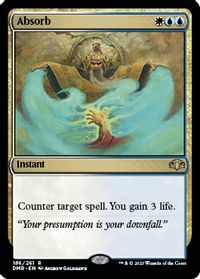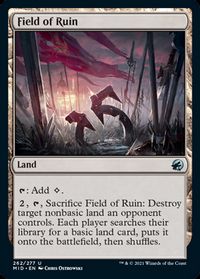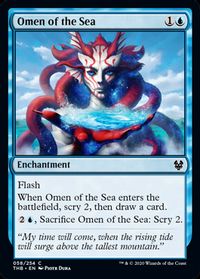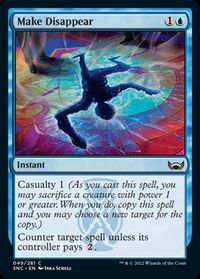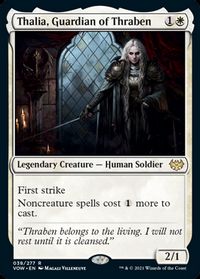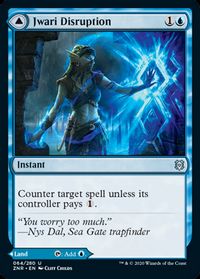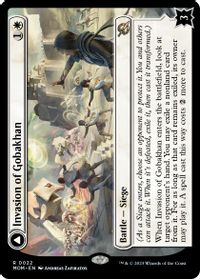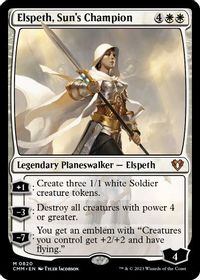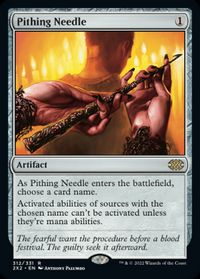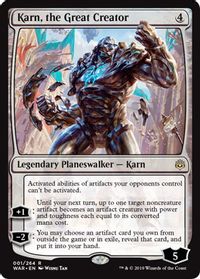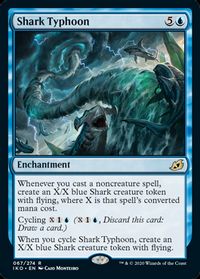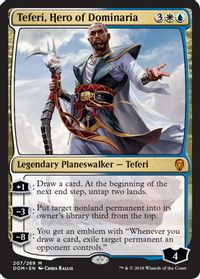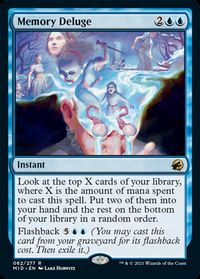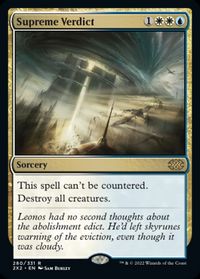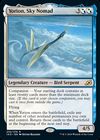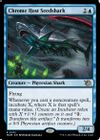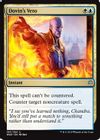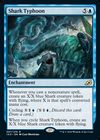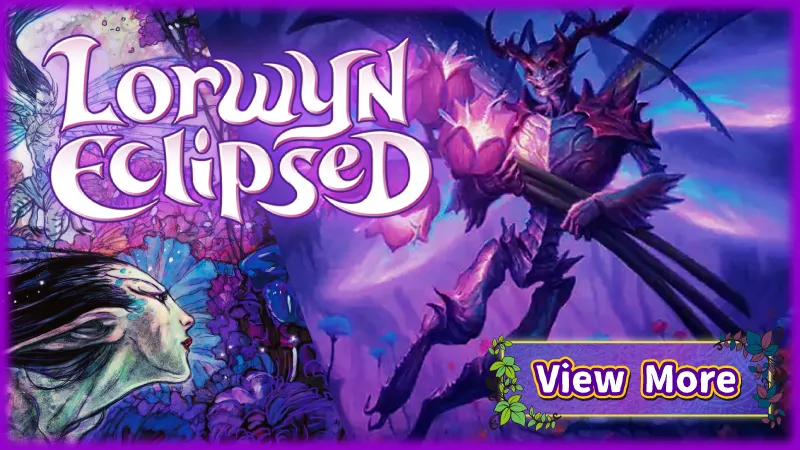Practicing Pioneer
My original plan for this round of Regional Championships was to just take it easy and play Rakdos Midrange without much testing. I had just had a strong finish at Pro Tour March of the Machines which gave me invites for the next two Pro Tours, so I didn’t need to worry about doing well at Regionals. But I had already bought my flights to Athens in December with some expiring bonus points, so I was going to go to Athens anyway. Not caring about the results meant that I could just treat the trip more as a vacation and less as a work trip.
That’s why Rakdos Midrange sounded appealing to me. I’ve been playing 《Fable of the Mirror-Breaker》 + 《Sheoldred, the Apocalypse》 decks for the past year in multiple formats already, and I had just played one at the previous Pro Tour in Standard, so it would be both easy to get the cards for and easy for me to play.
However, after years of playing competitive Magic, it’s not easy for me to just relax and play whatever deck is the most convenient. What else should I do in the evenings after work but test? My plan of “taking it easy” didn’t last very long and I soon started playing Preliminaries and Leagues on Magic Online.
At first, I just wanted to tune the Rakdos Midrange deck and learn how to play it. There were some options on how to build it, for example whether you wanted to play extra main deck 《Reckoner Bankbuster》 and 《Mutavault》, or the more traditional 《Kroxa, Titan of Death’s Hunger》.
But then the other Rakdos deck of the format caught my attention: Rakdos Sacrifice. My good friends Joonas Eloranta and Roope Metsä (Rhianne and Folero on Magic Online) had played the deck with very impressive results and it seemed to be in a very good position in the metagame. It was clearly favored against the Midrange version of Rakdos which we expected to be the most popular deck, as it has been for a while now. In addition to making Sacrifice look good, it also made the midrange deck less appealing.
I gave the Sacrifice deck a fair shot, I really did. I wanted to like the deck as it was winning a lot, but my heart just wasn’t in it.
All the time I felt like the cards in my hand were mopey and unexciting, and I had trouble assembling my synergies. My opponents would do something powerful and cool like go off with 《Fires of Invention》 and 《Keruga, the Macrosage》 while I was stuck with a litter of 《Cauldron Familiar》 in my hand without a 《Witch’s Oven》. Even when I won, I often felt like I just got lucky to topdeck a 《Mayhem Devil》 on the right turn, or my opponent got unlucky to never find an 《Indomitable Creativity》 and I somehow managed to kill them by attacking with an 《Unlucky Witness》 for 8 turns in a row.
I still respect the deck very much and I understand why the deck has its own fan base, but at some point I had to give up on it. It’s just not a deck for me. I am not an emotionless robot, and if I don’t like a deck I’m not going to play it very well.
Also, this trip was still as close to a vacation as it gets for me, and I wasn’t going to spend it on a deck I didn’t enjoy playing with. Almost all of my annual vacation days from work are spent on Magic trips, and while they are a lot of fun, I wouldn’t exactly describe playing in and testing for Pro Tours as relaxing activities.
That’s the downside of being a Magic Pro with a day job, and the reason why I really wanted to focus on enjoying the trip too instead of taking it super seriously. If you never reserve time for relaxing, it is easy to burn out. And that’s an important lesson I think: sometimes playing less is better for your long-term prospects as a Magic player. Having a balanced life is important if your goal is to do well in Magic for the next five years, and not just in the next tournament.
The Trip to Greece
Fortunately, we did get to do some of the relaxing part too. For the first half of our trip we took a ferry to the island of Andros, which was about two hours from Athens. The island was extremely beautiful and had great weather this time of year. We rented a car and drove to our Airbnb, which was in a small village located on the other side of the island from the main port. The view from the apartment was gorgeous:
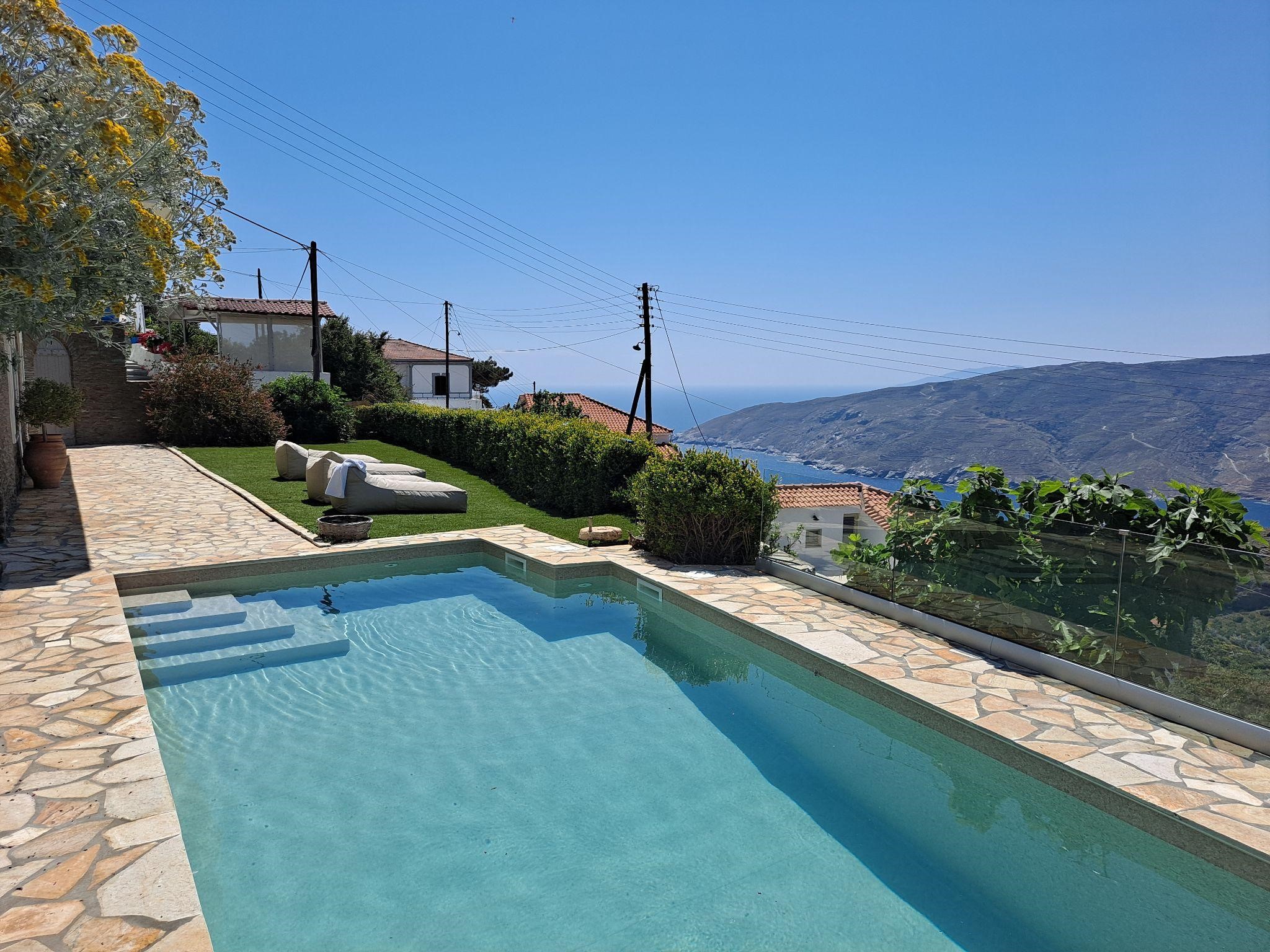
Shortly after we had settled into the house, results from the United States Regionals started pouring in. Rakdos Sacrifice was doing well, as expected, and Rakdos Midrange was not doing very well, which at this point I also kind of expected. My results with the Midrange deck were exceedingly mediocre, and I felt like the metagame was more than prepared for it. I couldn’t even find ways to get a meaningful edge in the mirror matches, so slowly but surely despair started settling in. Was there really nothing better available?
Then I saw that my teammates Abe Corrigan and Austin Bursavich had impressive results with an Azorius Yorion list that they had been tuning together for the U.S. Regionals. We had given them a lot of crap about Azorius Control being a “born loser” as Azorius had done absolutely terribly in the previous weekend’s tournaments, but the list that Austin and Abe had come up with honestly seemed pretty good to me.
Also, the previous weekend’s tournaments had been played with closed decklists, which I think is a significant disadvantage for the control decks, especially when your own archetype is to some extent revealed when you choose 《Yorion, Sky Nomad》 as your companion. Being able to mulligan to the kind of interaction you need is absolutely crucial against matchups like Mono Green and Mono White.
One addition I liked a lot from the new set was 《Chrome Host Seedshark》. Having flexible sideboard cards is extremely valuable for the Yorion builds. While you have more cards in your main deck than a normal deck, your sideboard is still the same size as everybody else’s. A bigger main deck means that you have more cards to board out than usual, which in turn means that you have to be able to sideboard in a lot of cards in almost every matchup.
That is simply impossible if your sideboard cards are targeted silver bullets like 《Rest in Peace》. However, 《Chrome Host Seedshark》 is such a versatile card that you can bring it in in almost any matchup, and it also makes your opponent’s sideboarding harder. How many removal spells are they supposed to have in their deck postboard?
I went to try the deck in a Magic Online League, immediately 5-0’d the first one and decided that this was gonna be it. The list felt very smooth and I really enjoy playing these kinds of decks – which is of course easier to say when you’re winning with them. I didn’t really know how good the deck was going to be, but at least I knew that I would be having fun in the tournament! All that was missing were the actual physical cards themselves, but fortunately a Finnish friend was coming to Athens later and was able to bring me an entire copy of the deck.
After playing with the deck, I didn’t really feel the need to modify Austin’s original list much. I moved a 《Farewell》 to the main deck because in some matchups it can be very critical to have access to it in long games (for example 《Greasefang, Okiba Boss》), and switched a 《Rewind》 to a 4th 《Dovin’s Veto》.
There was one copy of 《Rewind》 remaining which I didn’t really like, but it had its moments and I didn’t really have any clear ideas of what I would want to replace it with. In some matchups you just wanted access to a lot of counterspells, and the alternative counterspells after Dovin’s Veto all had their own downsides.
In retrospect I would have played a 3rd 《Absorb》 as the life gain can be very critical in some matchups, but it’s very demanding on the mana in a deck with 4 《Field of Ruin》.
When testing Azorius Control for the Pioneer PT earlier this year, I was traumatized by drawing too many 《Absorb》 and not being able to cast it on the same turn with 《Dovin’s Veto》 and losing games because of it. 《Saw It Coming》 is another common alternative, but that one just seems so far below the rate to me that I hope I never have to put it in my deck in any format.
Here is the list I ended up playing:
After the deck was locked in, we focused more on exploring the beautiful island. Among other things, we went to visit the capital city of the island, Chora, and hiked in the forests near the center of the island:
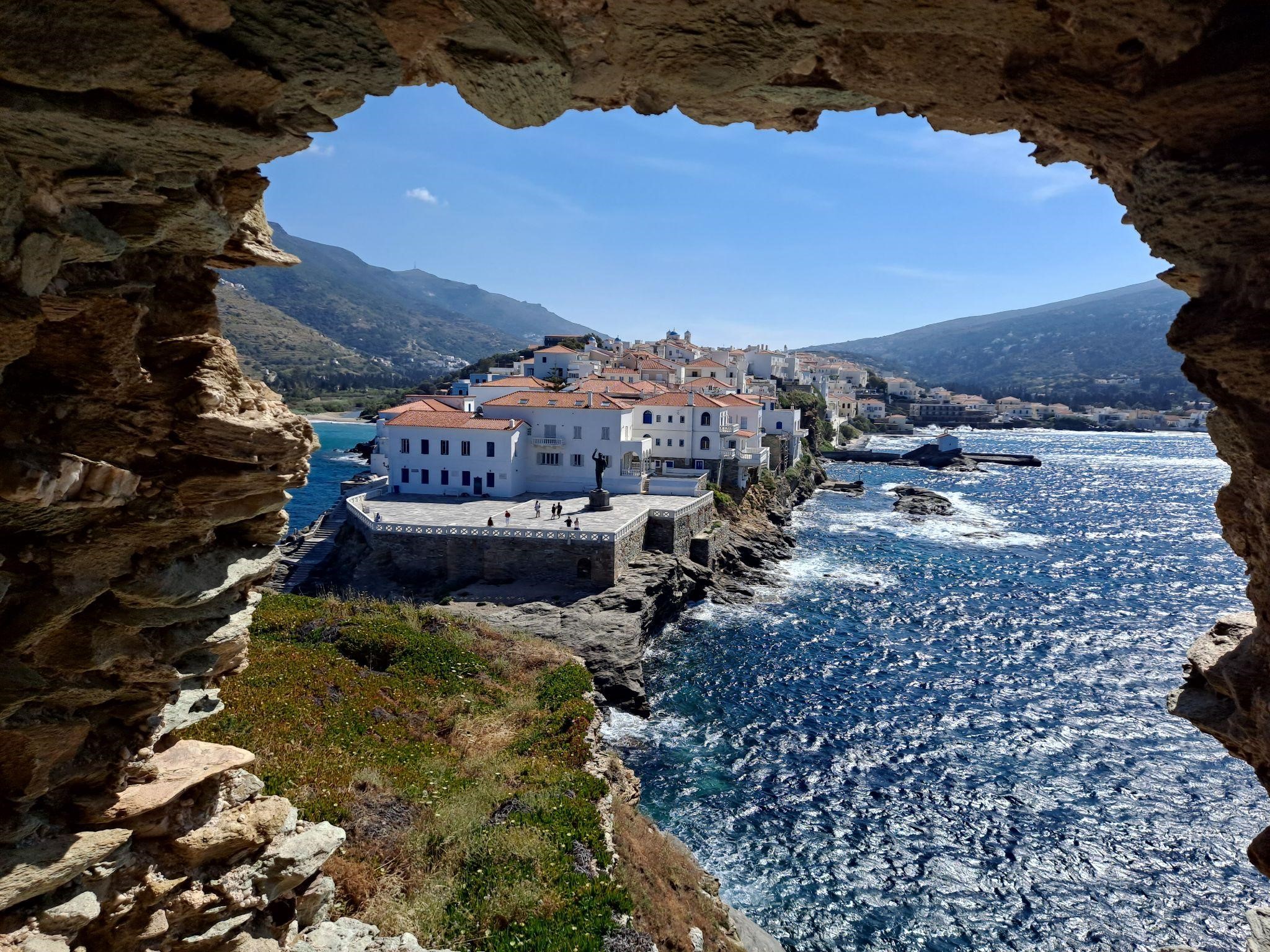
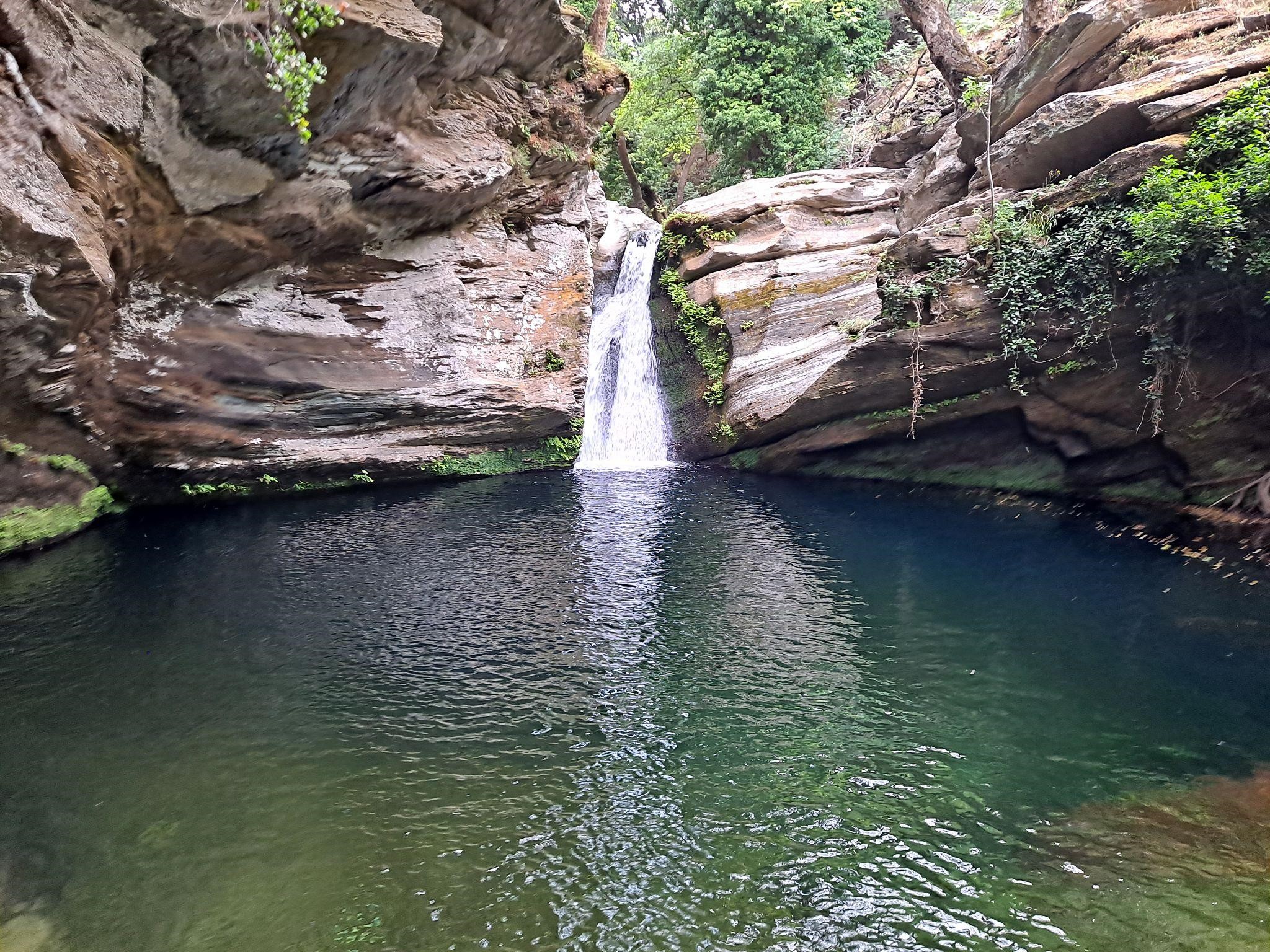
The European Regional Championship
Next, it was time to travel back to the mainland and play in the actual tournament! For last minute preparations we met up with my old friend Makis Matsoukas, who lives in Athens, and went for some food and drinks in downtown Athens. The Gathering is definitely the best part of Magic, and it was really nice to see my friend again after all these years.
Day 1
On day 1 of the tournament, my results and matchups were:
| Deck | Result |
|---|---|
| Rakdos Midrange | 2-1 |
| Gruul Vehicles | 2-1 |
| Gruul Vehicles | 0-2 |
| Omnath to Light | 2-0 |
| Mono White | 1-2 |
| Enigmatic Fires | 2-0 |
| Rakdos Midrange | 2-1 |
| Izzet Creativity | 2-0 |
| Mono White | 2-1 |
After a long day of Magic I felt happy with my deck choice but not nearly as happy with my plays. In both of the matches that I lost, I made a mistake that I was then punished for.
Against the Gruul Vehicles opponent I really needed to find a sweeper or a counterspell in response to his 《Esika’s Chariot》, so I cast an 《Omen of the Sea》 in response, putting one card to the bottom and the other one (a sweeper) to the top. But then I was somehow confused about what the 《Omen of the Sea》 does and drew two cards instead of one, and called a judge on myself.
The solution was that my opponent got to choose a card from my hand that was shuffled back into my deck, and they obviously chose the sweeper that I had topped with the 《Omen of the Sea》 and left me with the useless random extra card off the top. The “fix” from the judges seemed a bit strange to me, but I couldn’t really complain too much about it as it was clearly my own fault.
The other mistake against Mono White was more strategic in nature. My opponent cast a 《Thalia, Guardian of Thraben》 on turn 2 and I had to choose between countering it with 《Make Disappear》 or 《Jwari Disruption》.
On one hand, I had expensive spells like 《Farewell》 and 《The Wandering Emperor》 and only one more normal land, so I wanted to keep the 《Jwari Disruption》 so I could play it on my turn as a land in case I drew a spell.
On the other hand, using the 《Jwari Disruption》 now would make it more likely that I could counter their play next turn, as 《Make Disappear》 could do that more reliably, and that could buy me more time to draw the lands I needed. I ended up using the 《Make Disappear》, but that ended up backfiring hard.
I drew more lands off the top and my opponent cast a turn 3 《Invasion of Gobakhan》, which I couldn’t counter with the 《Jwari Disruption》. The Invasion took away my 《The Wandering Emperor》, I was annihilated without doing anything relevant for the rest of the short-lived game.
Then again, I couldn’t be too mad at myself about these mistakes. If you switch decks less than a week before an event, expecting perfect play from yourself would be unreasonable, and all things considered I believe I played mostly quite well. With mistakes it’s important to learn what you can and then move on – dwelling on them is simply not a productive use of your time. That is of course easier said than done and I can’t say I always manage to practice what I preach.
Day 2
Day 2 started off with a couple of lopsided matches. In the first round my cards just seemed to line up poorly against my opponent’s, and I got crushed by Rakdos Midrange. In the second round things went in the other direction, as my counterspells and 《Field of Ruin》 decimated an unfortunate Enigmatic Fires player who had to take a lot of mulligans.
In the third round of the day I got paired against Pro Tour winner Martin Dang and his Rakdos Midrange deck. We had three long, grindy games, but I managed to kill him on extra turns with an ultimate from 《Elspeth, Sun’s Champion》.
After that, I was put into a feature match against a Mono-Green Devotion player. The first game was rather unexciting, as he got stuck on lands and I countered some of his mana accelerators, so he never really got into the game.
The second game featured an incredibly resilient 《Pithing Needle》, which just refused to stay in exile. My opponent tutored for the Needle to stop my 《Teferi, Hero of Dominaria》 but I wasn’t worried as I had answers in hand. But despite 《March of Otherworldly Light》, 《Temporary Lockdown》 and 《Farewell》, the 《Pithing Needle》 just kept coming back. However, I eventually managed to play a planeswalker with a different name, and the tokens from 《The Wandering Emperor》 carried me to victory in a few turns.
In the next round I was paired against Mono White, but I don’t really remember anything from the match other than that I won 2-1. This win meant that in the last round I would be playing a win-and-in for the top 8!
In the final round I was paired against Azorius Spirits in the feature match area. In the first game I think he had to mulligan and then flooded out, so I had plenty of time to play around possible threats and cast my powerful cards. I never felt like I was in any danger in that game, but it took a while for me to find a way to actually win it.
In the second game, he was on the play and quickly ran me over. Game 3 was a real nail-biter though. He managed to stick an early 《Invasion of Gobakhan》 that made my life very hard, as it exiled a 《Shark Typhoon》, made his creatures bigger and then protected them. Eventually I managed to stabilize, but my life total was very low so the game was still on a razor’s edge.
At some point I topdecked a crucial 《Shark Typhoon》 that forced him to activate the flipped Invasion to save his creatures in combat. This lead to a bit of a board stall, as he couldn’t attack into my bigger creatures, but I also couldn’t attack because my life total was so low.
In the end I was in a spot where I was going to start casting 《Teferi, Hero of Dominaria》 from my hand and 《Memory Deluge》 from my graveyard, but time was called and I was not able to close the game in time. I think we played at a reasonable place throughout the match, but games 1 and 3 were long and complicated affairs.
In addition, the feature match area ran on a delayed round timer compared to the rest of the matches, so during the games we had no visibility to a clock that would tell us how much we had time left. I asked how much time we had left when game 3 started so I knew we needed to play at a fast pace, but couldn’t easily track the progression of time during the game, which ended up being very costly here.
If I had been able to do that, I would’ve put more effort into playing faster and likely been able to win the game. So this is a note for any tournament organizers reading this article: please make it so that the feature match players could also see the clock during their games, especially during important matches like win-and-ins.
As things were, I ended up casting a 《Supreme Verdict》 on my last extra turn to ensure that I couldn’t lose on his last turn. We had a short discussion at the end, but eventually the result was a draw and thus we were both out of the top 8.
This was a weird spot to be in. On one hand, I did really well in the tournament, and I felt like I should be happy about a 12th place finish. On the other hand, the draw in the last round left a sour taste in my mouth. Top 8 and a possible invite to the World Championships had been so close!
Then again, the draw was also a price of switching decks less than a week from the event, and not getting a sufficient amount of practice with it. Blue-White Control decks are notorious for being slow in basically all formats, and an increased likelihood of draws is a risk that every pilot needs to accept when choosing the deck for tournaments. Having enough practice is extremely valuable for these slow decks, as practice makes it a lot easier to make your decisions faster.
Summary
Even though I wasn’t completely happy with how the tournament ended, I still had a lot of fun during the trip and the tournament, and I found the Blue-White deck to be very enjoyable to play despite the issues with round time. The deck seems very good right now and I’m happy to recommend it to others as well. I would replace the 《Rewind》 with a third 《Absorb》 though!
Greece as a country also left a highly positive impression based on this trip. This was my first time visiting it, and I hope I get to do so again sometime soon! The food there is great, and getting to eat it with views like this is a nice bonus:
Until next time,
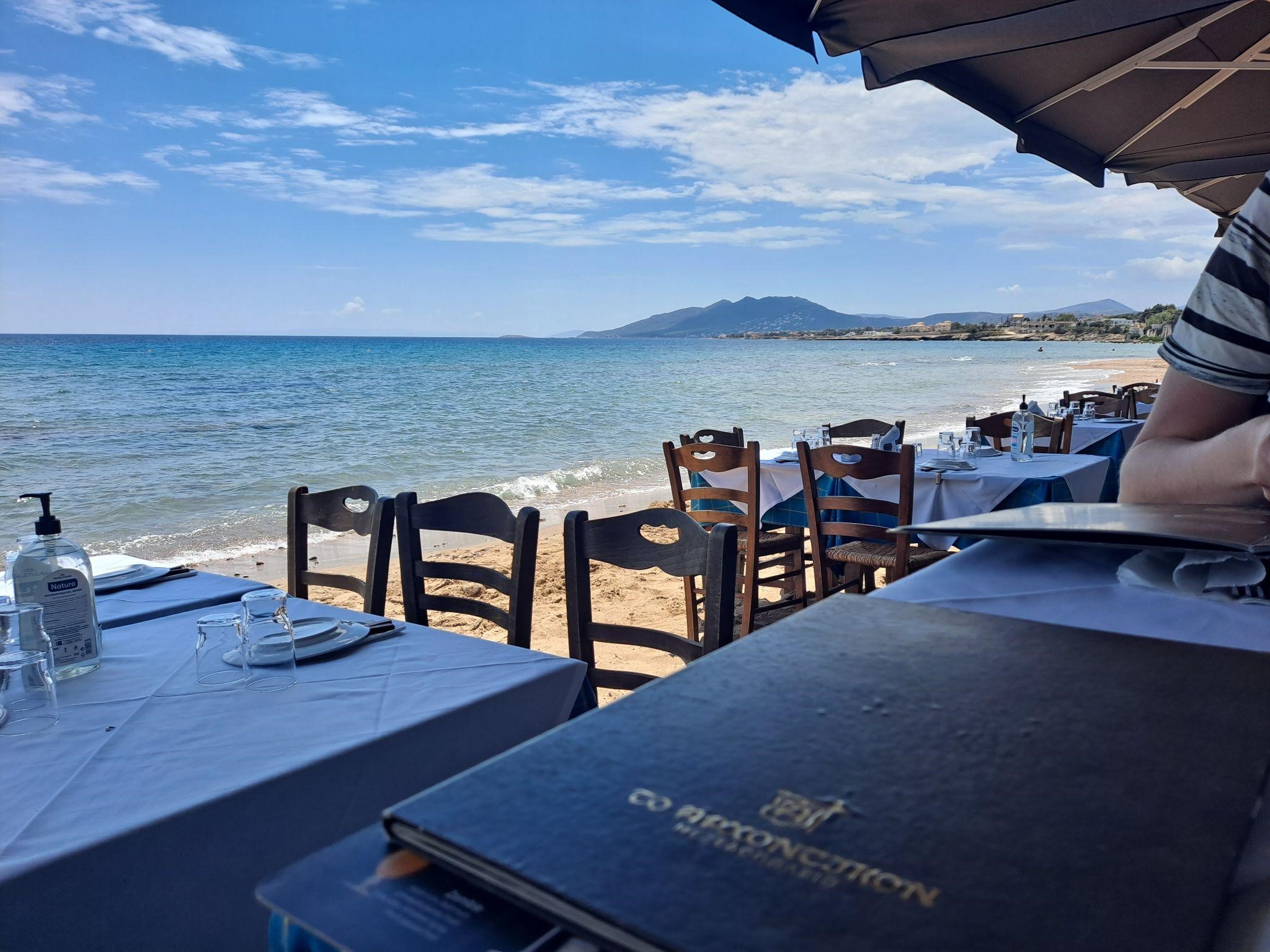
Matti Kuisma (Twitter)


